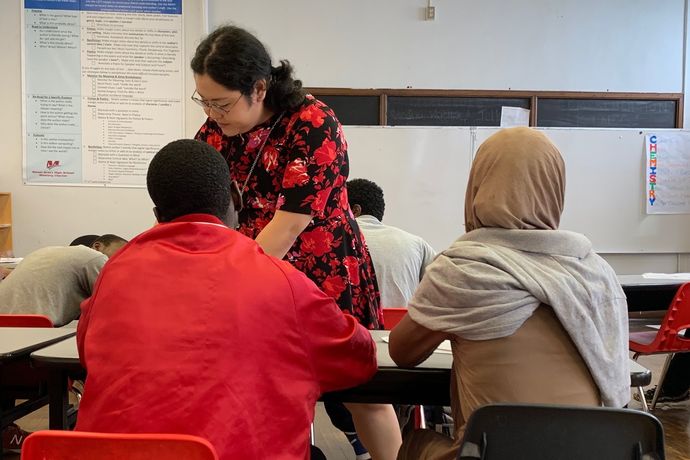Connecticut Welcomes 2019 Corps Members

August 12, 2019
In June, we welcomed the 2019 Teach For America corps members to Connecticut to begin preparing for classrooms this fall. They spent five days in Connecticut with several introductory sessions and a day in the community in New Haven and Hartford, where they completed service projects and met local leaders.
We kicked off their introduction to Connecticut and Teach For America (TFA) at our welcome dinner in Hartford at the Capitol Building with second-year corps members sharing stories from the classroom and the challenges and rewards of being new teachers. Christopher Todd, the bureau chief of the State Department of Education, provided keynote remarks to inspire our leaders.
Our corps members recently finished up institute, a five-week long foundational experience in Philadelphia that aims to shape the work to come. They taught summer school part-time and took sessions with Teach For America facilitators on creating rigorous classrooms, developing engaging lessons, and leading across lines of difference at their school and in their neighborhoods

In Philadelphia, they were joined by 450 corps members, eight TFA regions, and 85 staff members including Dwayne Jackson, a manager of Teacher Leadership Development from Connecticut’s New Haven Team. Jackson, a 2013 Connecticut corps member and staff member, designed and facilitated diversity, equity, and inclusion curriculum for the new corps. He shared with us the importance of institute in giving new teachers the time and space to do self-work that prepares them to learn and lead.
“Institute is a ‘crash course’ in feeling like you need to learn everything at once—teacher practices, leading student outcomes, diversity, equity, and inclusion, and lesson planning. As coaches, we are here to support their mindsets and intentions to lead them in staying committed to our core values. We hold up the mirror to help them reflect what supports they will need once their leading their own classrooms. What resources will you need? What partnerships must you seek out? What will this work look like for you after two years? We help them to envision the long-term impact,” says Jackson.
At institute, our aim is to have new corps members begin to see the ways in which their own learning and leadership development directly impacts their ability to achieve outcomes in a classroom. 2019 Connecticut corps member Fraz Lugay is building skills that he’ll apply once he returns to Connecticut and begins teaching high school biology.
“I'm excited to be learning and bring back a new attitude towards teaching science, framed around telling students less information and instead, asking them more questions to drive them towards discovering answers and trends in biology," says Lugay. "I now recognize how often I am doing the scientific thinking in the classroom instead of leading my students to do the majority of scientific thinking on their own,” he says. From direct classroom experience and supplementary institute sessions, Lugay is already framing new ideas to inspire and involve students in the classroom.
Also at institute, we focus on collective leadership, which strengthens the ways we work together to be a part of a broad and diverse coalition to accomplish systemic changes. Hannah Lewis, a 2017 Connecticut corps member has joined our transition team this year to help the new corps to internalize learnings and give insight into ways to make in impact teaching in Connecticut.
“Corps members are learning multiple ways to create a positive classroom culture. This includes and encompasses the diversity, equity, and inclusion work they are doing. They are learning how their identity and the identities of their students play into the classroom and how to build a classroom culture that is mindful of that. Corps members are also learning how to create a collective community to end educational inequity and I am excited to see how they use community building to reach all their learners!” says Lewis. Diversity, equity, and inclusion is an essential part of the programming for new corps members, preparing them to develop a culturally relevant pedagogy and work across lines of difference.
The days at institute are challenging and we ask our new corps to give their all in order to fully prepare them for the rigors of the school year. We do our best to help corps members strengthen their bonds with one another. Our regional team visits institute classrooms, observes instruction, and facilitates a community-building session.
This is a first step in building a community committed to each other and Connecticut. Corps members are now back in Connecticut preparing for the first day of school with students.
We’re eager to be back with students in just a few short weeks!


